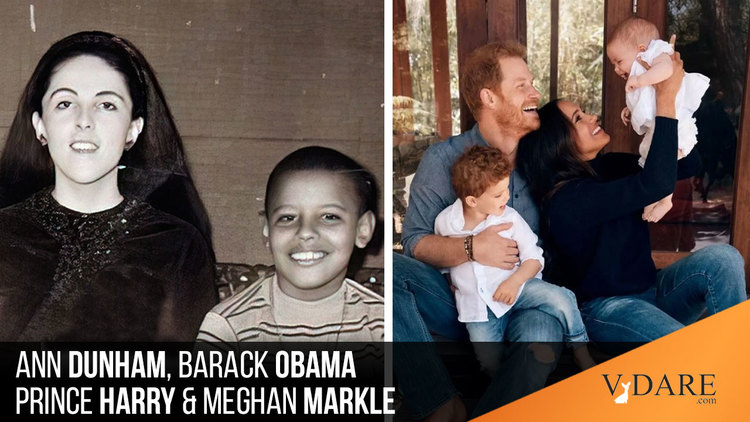
By Lance Welton
10/29/2022

If TV commercials are to be believed, most families in the US are mixed race. Of course they’re not, although since 2010 the number of people who claim to be multiracial has increased from 9 million, about three percent of the population, to 33.8 million, or 10.2 percent [Improved Race and Ethnicity Measures Reveal U.S. Population Is Much More Multiracial, by Nicholas Jones, Rachel Marks, Roberto Ramirez, and Merarys Rios-Vargas, Census.gov, August 12, 2021]. However, only about nine percent of those multiracial people (3.1 million) are white-black. Breaking news: It turns out that it matters whether their mothers were white or black.
Mainstream research and media tell us that “biracial” and “monoracial” Americans are identical psychologically, and importantly, in terms of IQ. They aren’t. More specifically, the IQ of a biracial child is linked to the race of the mother. Thus it is not surprising that the most successful biracial politician in American history, Barack Hussein Obama, had a white mother.
Some scientists have argued that because certain genes for intelligence are on the X chromosome, you inherit more of your intelligence from your mother than from your father. “Women are more likely to transmit intelligence genes to their children because they are carried on the X chromosome and women have two of these, while men only have one,” as the Independent explained about a study that has disappeared from the web [Children inherit their intelligence from their mother not their father, say scientists, by Charlotte England, Independent, December 23, 2019]. (But this has been disputed: No, Research Has Not Established That You Inherited Your Intelligence From Your Mother, by Emily Willingham, September 16, 2016).
Nevertheless, psychologist Meng Hu of the University of Hong Kong has found that having a black mother seems to be bad for IQ, race of the father regardless. Additionally, he suggests that IQ may be more genetic among blacks than other races [Testing the Race of the Mother Hypothesis: Does Mother’s Involvement Matter for The Cognitive Development of Interracial Children?, Open Psych, September 8, 2022]. In other words, black intelligence is more hardwired than that of whites, Asians and Hispanics, who are more influenced by their environment.
Understanding Hu’s findings requires some background.
In 1974, geneticists studied the effect of biracial parentage on the IQ of children by setting up two groups: one where the mother was black and the father white, and one where the mother was white and the father black [Intellectual development of children from interracial matings: Performance in infancy and at 4 years, by L. Willerman et al., Behavior Genetics, 1974]. The authors found little intelligence gap between “interracial” infants at 8 months old. By age 4, however, a considerable gap had arisen. Children with a black mother and white father were noticeably less intelligent than children with a white mother and black father.

The mother is usually the primary caregiver, feeding and stimulating the child intellectually — or not — which affects IQ. So the authors proposed that adequate parenting would diminish, or end, the racial IQ gap.
Hu disputed that theory in his Open Psych paper and at his Human Varieties blog, which he runs with three co-writers [Re-analysis of Willerman’s Study: Race of Mother’s Hypothesis, September 11, 2022].
Strong evidence shows that IQ gains attained in childhood, via such programs as Head Start, wash out in adulthood, which is why black children adopted by white families have an average or higher childhood IQ, but end up with an adult IQ closer to the black mean, as Arthur Jensen explained with his g factor. In childhood, the causes of IQ are mainly environmental; a child’s IQ reflects the IQ of parents and caregivers. But as he grows and leaves home, he creates his own environment consistent with his own innate intelligence. IQ will rise or, in the case of blacks adopted by white families, fall.
However, with biracial children of black mothers, Hu found, it’s not quite that simple. The “parenting effect” influences biracial children of black mothers, even controlling for socioeconomic status (SES). “After controlling for SES, the IQ gap at age 4 was as high as 7 points but dropped [to] 4 points at age 7,” Hu wrote at Human Varieties:
Without controlling for SES, the IQ gap is similar at both ages. Whether the gap would be further reduced later is unknown but it wouldn’t be surprising.
However, Hu thought those findings were likely due to sampling errors. So he retested using different data with which he could compare a number of different races. This led to all kinds of peculiar results, as he wrote at his blog:
Consider this. In the CPP [Willierman’s Collaborative Perinatal Project], White mother was positively associated with children IQ among Black-White mating, but White mothers had higher education than Black mothers. In the [High School Longitudinal Study of 2009], Black mother was positively associated with children score while they also had higher education than White mothers. In the CPP, White mother was negatively associated with children IQ among Hispanic-White mating while they also had lower education than Hispanic mothers. But in [The National Longitudinal Study of Adolescent to Adult Health], Hispanic mother had lower education and also was negatively associated with children verbal score (before controlling for SES).
The solution Hu proposes for these anomalies: The degree to which genes affect intelligence might be tied to race, as he also notes on his blog:
One challenge interpreting the data well is that SES may have a different impact across ethnic groups. For instance, if SES explains a huge portion of the Hispanic-White gap but only partially explains the Black-White gap, as is usually the case, it means additional factors have to be considered with respect to the Black-White cognitive gap.
This actually makes a great deal of sense. In his 1995 book Race, Evolution and Behavior: A Life History Perspective, J. Philippe Rushton argued that blacks and whites differ in “life history strategy.” Whites, and to an even greater extent Northeast Asians, are evolved to a harsh-yet-predictable ecology in which the carrying capacity for the species has been reached. They compete against each other and must adapt to the environment. So they take energy away from sex and direct it toward nurture, raising offspring to compete in very specific niches.

Blacks are evolved to an easy-yet-unstable environment, so invest more of their energy in copulation. Blacks have a shorter childhood than whites — they go through puberty earlier — and they age more quickly. So perhaps they are less environmentally plastic than whites. That goes back to the suggestion that black IQ is more hard-wired to genes than IQ in other races.
Having a black mother — again, race of the father regardless — lowers IQ even controlling for socioeconomic status, because the intellectual benefits of high socioeconomic status won’t much affect intelligence. IQ is more innate; more inborn.

That possible difference must be seriously researched. Maybe some significant data would be found by comparing the life and career achievements of biracial superstars like Obama, the son of Ann Dunham and, supposedly, a black African economist, to the biracial offspring of black mothers and white fathers.
A celebrity of that mix comes to mind: Meghan Markle, the Duchess of Sussex and wife of Prince Harry, the daughter of a white father and a black mother. Her public behavior and utterances suggest that she might not be the sharpest knife in the drawer.
This is not a good lookout for their children.
Lance Welton is the pen name of a freelance journalist living in New York.
This is a content archive of VDARE.com, which Letitia James forced off of the Internet using lawfare.